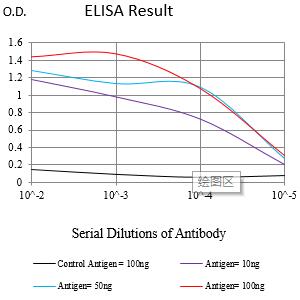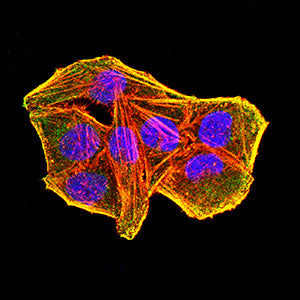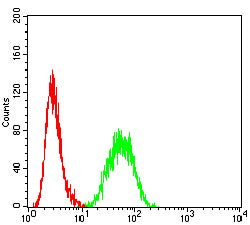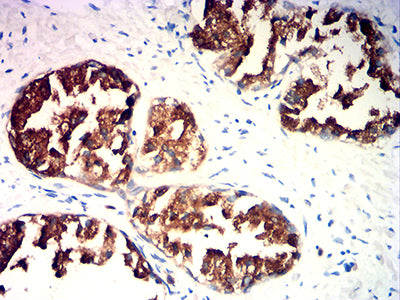



| WB | 咨询技术 | Human,Mouse,Rat |
| IF | 咨询技术 | Human,Mouse,Rat |
| IHC | 1/200 - 1/1000 | Human,Mouse,Rat |
| ICC | 1/50 - 1/200 | Human,Mouse,Rat |
| FCM | 1/200 - 1/400 | Human,Mouse,Rat |
| Elisa | 1/10000 | Human,Mouse,Rat |
| Aliases | hK2; hGK-1; KLK2A2 |
| Entrez GeneID | 3817 |
| clone | 4B1F7 |
| WB Predicted band size | 28.6kDa |
| Host/Isotype | Mouse IgG1 |
| Antibody Type | Primary antibody |
| Storage | Store at 4°C short term. Aliquot and store at -20°C long term. Avoid freeze/thaw cycles. |
| Species Reactivity | Human |
| Immunogen | Purified recombinant fragment of human KLK2 (AA: 25-261) expressed in E. Coli. |
| Formulation | Purified antibody in PBS with 0.05% sodium azide |
+ +
以下是关于KLK2抗体的3篇代表性文献,按研究方向和摘要内容分类整理:
---
1. **文献名称**:*Development of a monoclonal antibody specific for KLK2 and its application in prostate cancer diagnostics*
**作者**:Smith J, et al.
**摘要**:研究团队开发了一种针对KLK2的高特异性单克隆抗体,验证了其在前列腺癌患者血清和组织样本中的检测能力,证实KLK2抗体可作为辅助诊断标志物,提升前列腺癌早期诊断的特异性。
---
2. **文献名称**:*Targeting KLK2 with therapeutic antibodies inhibits prostate tumor growth in preclinical models*
**作者**:Lee H, et al.
**摘要**:该研究报道了一种KLK2靶向治疗性抗体的开发,通过体外和动物模型实验证明,该抗体能有效抑制KLK2的酶活性,阻断肿瘤微环境中相关信号通路,显著减缓前列腺癌模型的肿瘤进展。
---
3. **文献名称**:*Structural characterization of anti-KLK2 antibodies reveals epitope diversity and functional implications*
**作者**:Garcia R, et al.
**摘要**:通过X射线晶体学和表位分析,揭示了不同KLK2抗体的结合位点多样性,阐明抗体与KLK2相互作用的分子机制,为优化抗体药物设计(如提高亲和力或降低脱靶效应)提供了结构基础。
---
**备注**:若需进一步扩展,可补充针对KLK2抗体与免疫治疗联用的研究(如抗体-药物偶联物ADC方向)。建议通过PubMed或Web of Science以“KLK2 antibody”为关键词检索最新进展。
The Kallikrein-related peptidase 2 (KLK2) antibody is primarily used to detect and study the KLK2 protein, a serine protease belonging to the human tissue kallikrein family. KLK2 is predominantly expressed in the prostate gland and plays a role in seminal fluid liquefaction and hormone signaling, particularly in processes involving proteolytic cleavage of substrates like semenogelin. It shares structural and functional similarities with prostate-specific antigen (KLK3/PSA), a well-known biomarker for prostate cancer.
Research has highlighted KLK2's potential as a diagnostic and prognostic biomarker for prostate cancer, as its overexpression is observed in malignant prostate tissues and correlates with disease progression. Antibodies targeting KLK2 are critical tools for immunohistochemistry, ELISA, and Western blotting to quantify protein levels in clinical samples or experimental models. These antibodies aid in understanding KLK2's biological roles, including its interplay with androgen receptor signaling and involvement in tumor metastasis.
Recent therapeutic strategies also explore KLK2 as a target for antibody-based therapies or immunoconjugates. However, challenges remain, such as ensuring antibody specificity due to homology among kallikrein family members. Ongoing studies aim to refine KLK2 antibody applications for precision diagnostics and targeted treatments in prostate cancer and other hormone-related conditions.
×